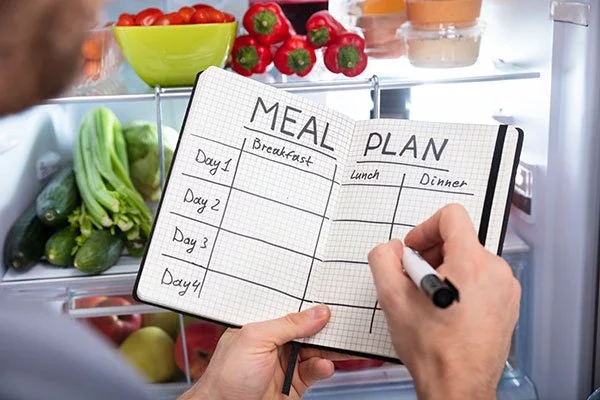Importance of Meal Planning

Weekly Meal Plan for Nigerian Families on a Budget
Meal planning is a crucial aspect of maintaining a healthy and balanced diet, especially for families. Here are some key reasons why meal planning is important:
1. Saves Time and Reduces Stress
Organized Shopping: Having a meal plan means you know exactly what ingredients you need for the week, making grocery shopping faster and more efficient.
Less Daily Decision-Making: Deciding what to cook every day can be stressful. A meal plan eliminates this daily decision-making process, reducing stress and saving mental energy.
2. Saves Money
Avoids Impulse Purchases: When you have a clear list of what you need, you're less likely to make impulsive buys that can add up quickly.
Minimizes Food Waste: By planning meals, you buy only what you need, reducing the amount of food that goes to waste.
Bulk Buying: Planning allows you to buy in bulk, which is often cheaper and helps save money in the long run.
3. Promotes Healthy Eating
Balanced Nutrition: Meal planning helps ensure that your diet includes a variety of foods from all the food groups, providing a balanced and nutritious diet.
Control Over Ingredients: When you plan your meals, you have control over the ingredients and can avoid unhealthy additives and excessive amounts of salt, sugar, and fat.
Portion Control: Planning your meals allows you to control portion sizes, which is important for maintaining a healthy weight.
4. Encourages Family Involvement
Family Participation: Involving family members in meal planning can be a fun activity and helps ensure that everyone's preferences are considered.
Teaches Kids: It teaches children about nutrition and the importance of a balanced diet, setting them up for healthier habits in the future.
5. Supports Dietary Goals
Weight Management: Whether you're trying to lose, gain, or maintain weight, meal planning can help you meet your dietary goals by keeping your diet on track.
Special Diets: For those with dietary restrictions or health conditions, meal planning ensures you adhere to your specific dietary needs.
6. Improves Cooking Skills
Variety of Recipes: Planning your meals encourages you to try new recipes and cooking techniques, which can improve your culinary skills.
Efficient Cooking: Knowing what you're going to cook each day helps streamline the cooking process, making it more efficient and enjoyable.
How Meal Planning Affects Your Fitness
Improving your fitness isn't just about hitting the gym-it starts in the kitchen. Meal planning is your secret weapon for achieving better health and wellbeing. It's not just about what you eat; it's about how you eat to support your body's needs. By organizing your meals ahead of time, you set yourself up for success-whether it's shedding pounds, gaining muscle, or just feeling better overall.
1. Supports Weight Management
Calorie Control: By planning your meals, you can better control your calorie intake, ensuring you stay within your daily limits. This is essential for weight loss or maintenance.
Portion Sizes: Meal planning helps you manage portion sizes, preventing overeating and helping you maintain a balanced diet.
2. Ensures Nutrient Balance
Macro and Micronutrient Distribution: A well-thought-out meal plan ensures you get the right balance of carbohydrates, proteins, and fats, along with essential vitamins and minerals. This balance is vital for energy levels, muscle repair, and overall health.
Variety of Foods: Planning meals allows you to include a variety of foods in your diet, ensuring you get a wide range of nutrients that are essential for optimal body function and performance.
3. Enhances Workout Performance
Pre-Workout Nutrition: Proper meal planning ensures you consume the right nutrients before your workouts, providing the energy and stamina needed for optimal performance.
Post-Workout Recovery: Planning post-workout meals helps in muscle recovery and replenishment of glycogen stores, which is crucial for building muscle and improving fitness levels.
4. Prevents Unhealthy Eating Habits
Reduces Impulse Eating: With a meal plan, you are less likely to resort to unhealthy, quick-fix meals or snacks. This helps in maintaining a clean diet that supports your fitness goals.
Healthy Snacking: By planning for snacks, you can ensure they are healthy and nutrient-dense, rather than high in sugar and unhealthy fats.
5. Saves Time and Reduces Stress
Efficient Meal Prep: Knowing what you're going to eat each day allows you to prepare meals in advance, saving time and reducing the stress of last-minute cooking.
Consistent Eating Schedule: A meal plan helps you maintain a consistent eating schedule, which is important for regulating metabolism and energy levels.
6. Improves Accountability and Consistency
Track Progress: Meal planning makes it easier to track what you eat and adjust your diet as needed to meet your fitness goals.
Stay on Track: Having a plan helps you stay committed to your dietary goals, reducing the temptation to stray from your nutrition plan.
7. Customizes to Fitness Goals
Tailored Nutrition: Whether your goal is muscle gain, fat loss, or endurance, a meal plan can be customized to meet these specific needs, ensuring you get the right nutrients to support your workouts.
Dietary Adjustments: Meal planning allows for adjustments based on workout intensity and progress, making it easier to optimize your diet for maximum results.
Meal Ideas and Cost-Saving Tips
Budget-Friendly Balanced Diet Meal Plan for 7 Days
| Day 1 | Oatmeal with bananas and honey | Jollof rice with grilled chicken | Beans and plantain porridge |
| Day 2 | Moi moi (bean pudding) with whole-grain bread | Pasta with tomato sauce and minced meat | Fried rice with mixed vegetables |
| Day 3 | Akara (bean cakes) with pap (ogi) | Chicken stew with potatoes | Egusi soup with eba (garri) |
| Day 4 | Vegetable omelette with toast | Fisherman soup with pounded yam | Coconut rice with grilled fish |
| Day 5 | Homemade granola with yogurt and fruits | Vegetable stir-fry with noodles | Tomato stew with rice and mackerel fish |
| Day 6 | Plantain chips with peanut butter | Egusi soup with eba (garri) | Jollof rice with grilled chicken |
| Day 7 | Fruit salad with yogurt | Beans and plantain porridge | Fried rice with mixed vegetables |
Cost-Saving Tips for Nigerian Families
Buy in Bulk: Purchase staples like rice, beans, and garri in bulk to save money.
Seasonal Shopping: Buy fruits and vegetables that are in season to get them at a lower price.
Local Markets: Shop at local markets where you can often negotiate better prices than in supermarkets.
Cook in Large Batches: Prepare large portions of meals that can be stored and eaten over several days.
Plan Ahead: Create a shopping list based on your meal plan to avoid impulse buying.
Reduce Meat Consumption: Incorporate more plant-based proteins like beans and lentils into your meals.
Homemade Snacks: Make your own snacks like granola and plantain chips to save money.
Breakfast Ideas
Oatmeal with Bananas and Honey: A quick and nutritious breakfast that's affordable and easy to prepare.
Moi Moi with Whole-Grain Bread: High in protein and fiber, perfect for starting the day.
Akara with Pap: Traditional Nigerian breakfast that is both filling and budget-friendly.
Vegetable Omelette with Toast: A versatile breakfast option that can be customized with seasonal vegetables.
Homemade Granola with Yogurt and Fruits: A healthy and cost-effective alternative to store-bought cereals.
Plantain Chips with Peanut Butter: A tasty and energy-boosting breakfast option.
Fruit Salad with Yogurt: A refreshing and nutritious way to start the day.
Lunch Ideas
Jollof Rice with Grilled Chicken: A classic Nigerian dish that can be made in large quantities.
Pasta with Tomato Sauce and Minced Meat: Simple and affordable, perfect for a family meal.
Chicken Stew with Potatoes: A hearty and satisfying lunch option.
Fisherman Soup with Pounded Yam: Rich in flavor and nutrients, ideal for a wholesome meal.
Vegetable Stir-Fry with Noodles: Quick to prepare and full of vitamins and minerals.
Egusi Soup with Eba: A traditional Nigerian favorite that is both nutritious and cost-effective.
Beans and Plantain Porridge: A delicious and filling lunch that is easy on the wallet.
Dinner Ideas
Beans and Plantain Porridge: A nutritious and hearty dinner option.
Fried Rice with Mixed Vegetables: A versatile dish that can be made with various leftover ingredients.
Egusi Soup with Eba: A satisfying meal rich in protein and healthy fats.
Coconut Rice with Grilled Fish: A flavorful dinner that's perfect for a family meal.
Tomato Stew with Rice and Mackerel Fish: A classic Nigerian dinner that's both affordable and delicious.
Jollof Rice with Grilled Chicken: A crowd-pleaser that can be enjoyed by the whole family.
Fried Rice with Mixed Vegetables: A nutritious and easy-to-make dinner option.
Conclusion
Budget meal planning is a practical way to ensure your family enjoys healthy, balanced meals without overspending. By incorporating these cost-effective meal ideas and following the money-saving tips, Nigerian families can maintain a nutritious diet while keeping expenses in check. Remember, the key to successful meal planning is consistency and creativity. Experiment with different recipes, adjust based on seasonal availability, and involve your family in the process to make meal times enjoyable and stress-free.
Frequently Asked Questions
1. How can I save money on groceries in Nigeria?
Shop at local markets, buy in bulk, and plan your meals ahead of time to avoid impulse purchases.
2. What are some affordable protein sources for Nigerian families?
Beans, lentils, eggs, and affordable cuts of chicken and fish are great protein sources that won't break the bank.
3. How can I ensure my family eats a balanced diet on a budget?
Include a variety of fruits, vegetables, grains, and proteins in your meals. Planning and preparing meals in advance can also help maintain balance and reduce costs.
4. What are some budget-friendly snacks for Nigerian families?
Homemade granola, fruit salads, and plantain chips are healthy and affordable snack options.
5. Can I still enjoy traditional Nigerian meals on a budget?
Absolutely! Many traditional Nigerian meals are made from affordable and readily available ingredients. The key is to plan your meals and shop smartly.

















Comments